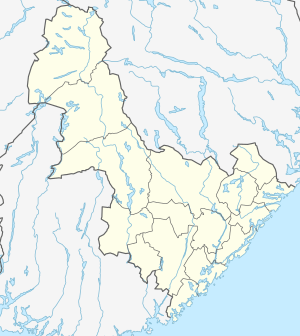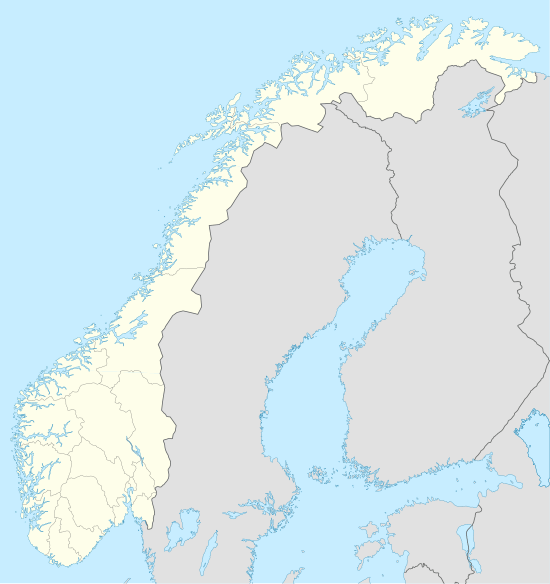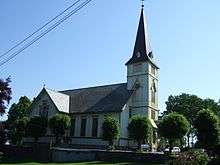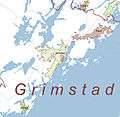Grimstad (town)
| Grimstad | |
|---|---|
| Town | |
 View of the town harbour | |
 Grimstad Location of the town  Grimstad Grimstad (Norway) | |
| Coordinates: 58°20′26″N 8°35′36″E / 58.3405°N 08.5934°ECoordinates: 58°20′26″N 8°35′36″E / 58.3405°N 08.5934°E | |
| Country | Norway |
| Region | Southern Norway |
| County | Aust-Agder |
| District | Østre Agder |
| Municipality | Grimstad |
| Area[1] | |
| • Total | 9.41 km2 (3.63 sq mi) |
| Elevation[2] | 4 m (13 ft) |
| Population (2016)[1] | |
| • Total | 12,522 |
| • Density | 1,331/km2 (3,450/sq mi) |
| Time zone | UTC+01:00 (CET) |
| • Summer (DST) | UTC+02:00 (CEST) |
| Post Code | 4876 Grimstad |
Grimstad (![]()
Grimstad Church is located on a small hill overlooking the town's harbour. The University of Agder is located in the town as well.
History

The village of Grømstad existed for a long time as part of the ancient prestegjeld of Fjære. It is reportedly first mentioned as a harbor in the 16th century. Eight years after he was deposed, Christian II of Denmark–Norway (1513–1523) attempted to recover his kingdoms. A tempest scattered his fleet off the Norwegian coast, and on 24 October 1531, they took refuge at Grimstad. On 1 July 1532, he surrendered to his rival, King Frederick I of Denmark, in exchange for a promise of safe conduct. King Frederick failed to honor his promise and imprisoned Christian until he died.[4]
An inn is recorded at Grimstad as early as 1607. In 1622, the village was granted ladested status under nearby Arendal due to its growing harbour and trading which gave it certain trading rights.[5] By 1747, Grimstad was identified as a sailing community and a recognized haunt of smugglers. During the Napoleonic Wars, England blockaded Norway. In 1811, an English brig entered the harbor to capture blockade runners, but was vigorously repulsed and did not return.
John Frederik Classen, who owned the Frolands Værk (an ironworks), obtained concessions to export and import through Grimstad and bypass Arendal with its customs dues. Grimstad was awarded market town status in 1816.[5]
The town of Grimstad was established as a municipality on 1 January 1838 (see formannskapsdistrikt). On 1 January 1878, part of the neighboring municipality of Fjære (population: 948) was transferred to Grimstad. Again, on 1 January 1960, another part of Fjære (pop: 344) was transferred to the town of Grimstad.
On 1 January 1971, the rural municipalities of Fjære (pop: 6,189) and Landvik (pop: 2,781) were merged with the town of Grimstad (pop: 2,794) to form a significantly larger municipality of Grimstad with a total population of 11,764 at the time of the merger.[6]
Name
The town's name was originally Grømstad, when Norway belonged to the Danish kingdom. The name was misunderstood and became Grimstad during the registration of Norwegian cities and small places. The site of the town was originally the port (Old Norse: stoð) of the old Grøm farm. The exact meaning of the name Grøm is uncertain, but it is derived from a river name Gró or Gróa which means "the growing one".[5]
Media gallery
- View of the harbour.
 Another view of the harbour.
Another view of the harbour. Town centre
Town centre Overview of the town.
Overview of the town.
 Storgata road in Grimstad.
Storgata road in Grimstad. View of Grimstad before 1957.
View of Grimstad before 1957. Expansion of Grimstad in 1971: Landvik, Fjære, Eide, and the town of Grimstad were all merged.
Expansion of Grimstad in 1971: Landvik, Fjære, Eide, and the town of Grimstad were all merged. 2005 map of the "urban area" of Grimstad.
2005 map of the "urban area" of Grimstad. Panorama of Grimstad
Panorama of Grimstad
References
- 1 2 3 Statistisk sentralbyrå (1 January 2016). "Urban settlements. Population and area, by municipality".
- ↑ "Grimstad, Grimstad (Aust-Agder)". yr.no. Retrieved 2017-11-16.
- ↑ Thorsnæs, Geir, ed. (2015-07-19). "Grimstad – tettstedet". Store norske leksikon (in Norwegian). Kunnskapsforlaget. Retrieved 2017-11-16.
- ↑ Taylor-Wilkie, Doreen, ed. (1996). Norway. Houghton Mifflin. ISBN 0395819121.
- 1 2 3 Thorsnæs, Geir, ed. (2017-11-02). "Grimstad". Store norske leksikon (in Norwegian). Kunnskapsforlaget. Retrieved 2017-11-16.
- ↑ Jukvam, Dag (1999). "Historisk oversikt over endringer i kommune- og fylkesinndelingen" (PDF) (in Norwegian). Statistisk sentralbyrå.
